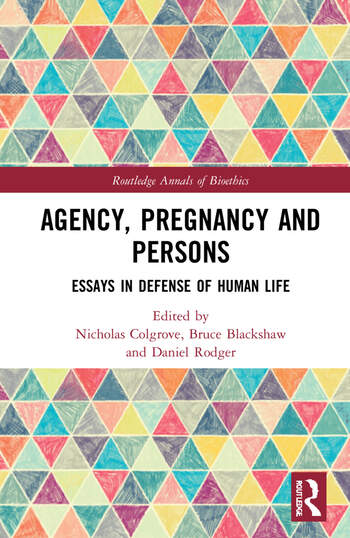“Agency, Pregnancy, and Persons” on Adoption
This post is part of a summary series condensing the information available in Agency, Pregnancy and Persons: Essays in Defense of Human Life, by Colgrove, Blackshaw, and Rodger. Covered here are the points made by Katy Finley in Chapter 8.

“You aren’t allowed to be pro-life unless you adopt.”
Charges of inconsistency are frequently made against opponents of abortion. Some of these charges specifically refer to adoption and are reflected in statements such as, “You aren’t allowed to be pro-life unless you adopt.”
Katy Finley in Chapter 8 of Agency, Pregnancy and Persons makes this point and then argues that, while arguments that oblige abortion opponents to adopt do not ultimately succeed, abortion opponents nevertheless do have compelling reasons to adopt. By “adopt,” Finley means adopting and/or fostering children as well as supporting those systems in some concrete way.
Finely shares the arguments commonly put forth and responds to them.
Do opponents of abortion increase the number of children in foster care?
The first argument put forth that abortion opponents should adopt is that they contribute to an increasing number of children who need adopted and are therefore in the foster care system, often experiencing severe harm.
Finley says this argument turns out to be unsound, since research strongly suggests that most women do not actually see adoption as the main alternative to abortion. She cites research that 91% of women turned away from receiving abortion chose to parent, while only 9% placed their children for adoption.
Furthermore, children are typically placed for adoption through a private agency that matches the child with a family, and a child adopted in this manner would be unlikely to ever enter the foster care system. The foster care system, rather, temporarily separates children from their biological families due to abuse or neglect. So increasing abortion restrictions simply expand the number of children placed for adoption through an agency, not through the foster care system.
Should stance on abortion influence who adopts?
The second argument put forth that abortion opponents should adopt is that, since they think killing a fetus is killing an innocent, vulnerable human, they should likewise believe that innocent, vulnerable children in foster care should not be killed or severely harmed. Therefore, they are obligated to intervene by adopting. If fetuses should not be killed and deprived of a future, why should children be severely deprived of goods due to time spent suffering in foster care?
Finley responds that it is unclear why abortion opponents specifically should be obligated to protect and care for innocent and vulnerable children; shouldn’t this obligation apply generally, regardless of stance on abortion? She says it’s also unclear why the obligation is specifically to adopt rather than to help in other ways such as working against childhood poverty, hunger, or abuse. Finley also points out that, just because we should not kill fetuses (a negative obligation), it doesn’t follow that we have a positive obligation to adopt.
Reasons that opponents of abortion should adopt:
Nevertheless, Finley argues there are compelling reasons for abortion opponents to adopt. The first is that doing so may reduce future abortions by shifting how mothers understand adoption. A study (Foster 2020) showed that women seeking abortions, whether they received them or were turned away, cited reasons against adoption including guilt, fear of the emotional pain of separation, lack of knowledge and control over the child’s care, fear of being judged, and fear of later confrontation by the child. Others reported not wanting to add to the problem of too many children already in need of homes.
Open adoptions are more positive experiences for birth mothers.
Yet Finley points out a large shift current taking place in the adoption system from closed adoptions to open adoptions, a shift that resolves each of these concerns. In open adoptions, birth parents may have regular contact with their child and adoptive families. Estimates in the U.S. are that 60-95% of adoptions are open. Abortion opponents, by participating in or supporting open adoptions, can contribute to adoption experiences that are more positive for birth mothers and therefore seen as a more viable option for women considering abortion. Specifically adopting girls from foster care further serves this purpose, because young foster women have more than double the rate of pregnancy of the general population and would be more likely to seek out an abortion.
Adopting reflects an integrity that goes beyond mere obligation.
Finely says a second reason for abortion opponents to adopt is that doing so is a powerful way for them to live out their commitments with integrity. Opposition to abortion imposes weighty costs on women getting abortions, the majority of which are young, of lower socioeconomic status, and disproportionately non-white. Although a diverse group of people opposes abortion, many of the most visible abortion opponents are older, wealthier, and more often white folks in political, religious, and academic fields likely to feature men. There is therefore a higher demand from abortion opponents for an integrity that goes beyond mere obligation and bears the weighty costs of their moral convictions. Adoption comes in as a powerful way to oppose abortion with integrity. Adopting also aligns with abortion proponents’ values such as protecting the innocent and vulnerable, demonstrating their care for people who their opponents agree are of great moral value. Finley says it’s worth noting that many opponents of abortion do put enormous efforts towards adopting. He cites research demonstrating that pro-life people and organizations are some of the most impactful for these issues. Although many abortion opponents fail to be similarly committed, popular narratives about abortion opponents are somewhat misleading and inaccurate in this regard.



